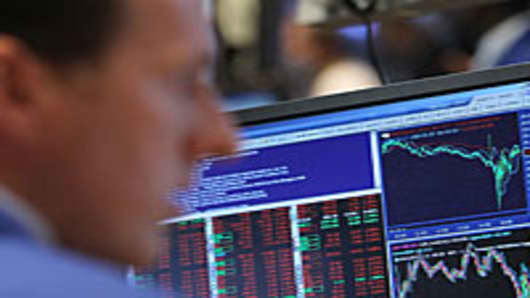Over the past one month, U.S. stocks have given up almost all their gains of the year, making valuations look very attractive, but one expert cautions against falling for these "cheap" stocks.
"I would go a hundred percent equities if I thought that we had reached a point when equity values made sense," Andre Kovensky, Managing Director of bond and real estate investment firm, Octavia Investment, told CNBC Asia's "Squawk Box."
The S&P 500 Index is 7 percent off its 2012 peak achieved in April with valuations at 15 times forward earnings, compared with a 20-year historical average of 19 times.
"People always say stocks are cheap, stocks are cheap. They're trading 10 times forward PE, 12 times PE. The problem is, I don't know the E(arnings)," he said.
Kovensky is not convinced about U.S. companies' earnings potential, saying the corporate sector has been propped up by debt.
"What if the U.S. had a balanced budget? What would GDP be? Then what would earnings be? The U.S. cannot in perpetuity run a $1.3 trillion annual deficit. I don't believe in any of the earnings numbers," he said.
Kovensky adds that he will not be buying stocks because the U.S. economy and stock market have been supported by decades of debt and the situation cannot be sustained indefinitely. When the Federal Reservesells the almost $ 3 trillion securities on its balance sheet, it will drag all asset values lower, he added.
"You basically have 30 years of accumulated debt that funds consumption and that has to unwind," he said. "And as it unwinds, it's going to have implications on economic activity and it's impossible that it won't ultimately find its way back to U.S. companies."
Data from the St Louis Federal Reserve show that outstanding debt in non-financial and non-farm companies in the U.S. rose to an all-time high of $7.8 trillion at the end of 2011, up 6 percent from a year ago.
However, Mark Matthews, Head of Research, Asia At Bank Julius Baer said the U.S. corporate debt is actually improving and stocks are looking relatively cheap.
"The chart of debt looks scary but in relative terms it has come down a lot, and the corporate sector in the U.S. has a tremendous amount of cash, about $1.25 trillion, a 60-year high relative to assets," Matthews said. "This bodes well for increased dividends and mergers and acquisitions."
Besides Kovensky, another analyst who is worried about the U.S. debt is Nicholas Ferres, Investment Director of Global Asset Allocation at Eastspring Investments. He believes while U.S. firms should be able to finance their debt, investors cannot ignore it.
The fallout in the U.S. corporate sector will come when the U.S. government and households stop spending, he said.
"Debt was essentially "swapped" from the private sector to the public sector," said Ferres. "What happens if the household sector no longer reduces savingsto fund consumption or the public sector is forced to consolidate?"
By CNBC’s Jean Chua.


